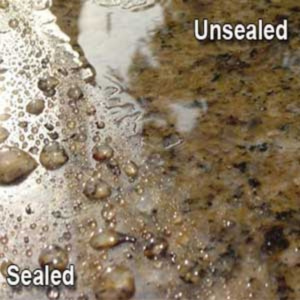Marble Floor Sealing

Sealing Natural Stone Floors
Several factors must be considered prior to determining if the stone should be sealed:
• What is the hardness, density, and durability
of the stone?
• How porous is the stone and how fast will it
absorb a liquid (also referred to as the absorption
coefficient)?
• Is the stone expected to be in frequent contact
with a staining agent?
• What type of finish was applied to the surface?
For example, a polished surface is more resistant
to staining than a honed surface.
• Will the sealant affect the color or other
aesthetics of the stone?
• If a resin was applied to the stone, how will the
sealant react with the resin?
• Where is the stone located (e.g. countertop,
floor, wall, foyer, bathroom, etc.)? Residential
or commercial?
• What type of maintenance program has the
stone been subject
ed to?
The type of stone, its finish, its location, and how
it is maintained all need to be considered when deter
mining how to protect the stone.
In most cases it makes sense to reseal the stone periodically. Once properly sealed, the stone will be protected against everyday dirt and spills. In other cases, it is best to leave the stone untreated. Topical sealers can alter the surface texture and finish as well as build up on the surface, creating a layer that is less durable than the stone. Generally, topical sealers are not recommended because they can trap moisture within the top layer of the stone, which may lead to surface deterioration.
StoneTex recommends that care be exercised in the application of any chemical to a natural stone surface. Although normally innocent in and of themselves, some sealers have reportedly reacted with some cleaning/maintenance chemicals and/or with components within the stone surface, causing some reactions.
If you have decided to treat your stone, make sure you understand the differences between the types of seal- ers available on the market:
• Topical Sealers are coatings (film formers) designed to protect the surface of the stone against water, oil, and other contaminants. They are formulated from natural wax, acrylic, and other plastic compounds. When a topical sealer is applied, the maintenance program often shifts from a program focused on stone care to a program focused on the maintenance of the sealer (for example: stripping and reapplication).
• Impregnators are water- or solvent-based solutions that penetrate below the surface and become repellents. They are generally hydrophobic (water-repelling), but are also oliophobic (oil-repelling). Impregnators keep contaminants out, but do not stop the interior moisture from escaping. These products are considered “breathable,” meaning they have vapor transmission. Vanity tops and food preparation areas may need to have an impregnator applied.
"Measure twice, cut once"
Check with your installer for recommendations. If an impregnator is applied, be sure that it is safe for use on food preparation surfaces. If there are questions, check with the product manufacturer.
Before sealing, always:
• Read the Manufacturers Warranty and Instructions.
• Contact the manufacturer prior to application if
you are unsure or need clarification. The wood-working analogy of "measure twice, cut once" applies.
• Consider the life span of the application (1-year,
2-years, 5-years, etc.) - keep a log of each
application.
• Don't switch from one product to another without
fully understanding any potential issues. Not all
products are alike.
• Consult with StoneTex as necessary.

